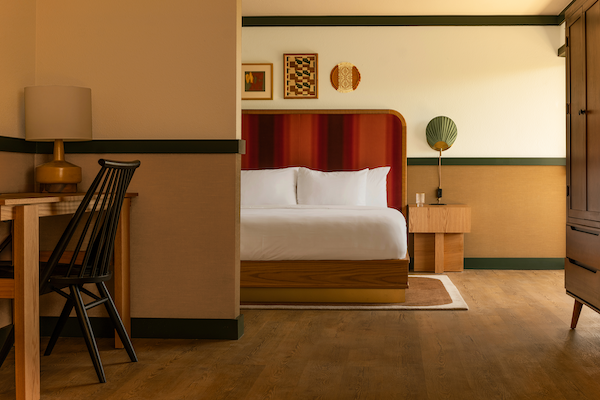In fall 2021, the Ace Hotel in Pittsburgh’s East Liberty neighborhood reopened after being forced to close during the COVID-19 pandemic. Only thing was, it no longer was the Ace Hotel. Now called The Maverick by Kasa, the hotel’s owner decided to jettison Ace as the operator and install Kasa, which manages accommodations and bills itself as “tech-enabled hospitality for the future.”
Not only did Kasa pick up the former Ace Hotel in Pittsburgh; in January, it was tapped to run the erstwhile Ace Hotel Downtown Los Angeles, now operating as the STILE Downtown Los Angeles by Kasa.
Kasa is among a set of burgeoning technology-led management companies that seek to streamline operations and expand profit margins. In the case of the Pittsburgh hotel, ownership decided to make the switch to bolster profitability by doing more with less. Other owners are taking a similar approach and engaging companies like Kasa, part of a subset of tech-led management companies whose business models differ from more traditional operators in the space.
The directive for how the template works is an easy explanation: lower the cost structure of operating properties. Getting there, however, takes nuance, discipline and alchemy, according to Kasa Founder & CEO Roman Pedan, who started Kasa in 2016 fresh off three years at private equity giant KKR. “There are going to be more situations where the existing cost structure doesn’t work and the existing manager or brand doesn’t work. Owners are looking for alternatives,” he said.
In its pitch to owners, Kasa, which last October closed a $70 million Series C fundraise, promises GOP margins in the 55% to 70% range for hotels with sub-200 keys. (In the U.S., and according to HotStats, on a rolling 12-month-basis, select-service profit margins average 40%.) This, it notes, can be achieved with one to 10 full-time employees per property and direct bookings accounting for around 40% of business.

Better with Less
The film “Moneyball” chronicles the general manager of major league baseball’s Oakland Athletics and his wonky, yet seminal approach to arranging a winning ball club with the third-lowest payroll in the league. Using an approach called sabermetrics, he is able to isolate under-appreciated or under-looked ballplayers, who are typically good at one important thing: getting on base, which leads to scoring runs, which leads to winning games.
Kasa, and its peers in the space, promote a similar approach. In their case, revenue management pinch hits for on-base percentage. In its deck to prospective partners, Kasa refers to itself as “revenue-management scientists,” equipped with an “automated, parameter-based pricing system,” which improves RevPAR index without higher marketing spend. This strategy, along with centralizing back-office functions and reducing the fixed-labor cost, it says, results in higher profitability—an end-product owners covet.
One of Kasa’s peers is Life House, which, like Kasa, takes a tech-centric approach to operations. The company, which has raised more than $100 million to date, according to Crunchbase, was launched in 2014 by its founder, Rami Zeidan, who departed the company in March 2024 after what was reported as internal disgruntlement by some Life House owners. Prior to his resignation, HOTELS spoke with Zeidan, who launched the company on the principle that small- and medium-sized independent hotels were being underserved. “There are a lot of operators that operate branded hotels and try to manage them like independent hotels, but they’re completely different animals,” he said, noting the rigidity that most branded hotels encounter due to certain requirements that often include having to use the brand’s proprietary systems. “Independents are more of a blank slate and have flexibility.”
Life House is first and foremost focused on a hotel’s owner and providing them a turnkey tech product that enhances profitability. And it works with different types of properties: its Denver hotels was a ground-up development, while Palm Springs was a motel conversion. “The whole idea here is that owners don’t know hotel operations and usually don’t know hotel branding and concept development,” Zeidan said.
But Zeidan also calls technology “a bottleneck to innovation,” with hotel management companies often beholden to third-party software and frequently resistant to change, wanting to stick with a tech stack they are accustomed to, only, maybe, easier to use. “When you think about innovation, it’s not do the same thing slightly easier,” Zeidan said. “It’s how do we rethink how we do all things altogether?”

The idea, Zeidan said, behind Life House is to “radically” simplify the hotel tech stack. It looks at it through the lens of two basic modules: back office and front office. “The challenge,” Zeidan said, “is to make money with software, you need scale. It’s expensive to sell to small hotels because of the little revenue. Everyone tries to go to the chains.” The problem arises, he said, when the larger chains agree to buy software, but only if it can be adapted to and enhance existing legacy features. “There’s a concept in tech land called being either a product company or a feature company,” Zeidan said. “Product companies actually solve problems and feature companies don’t.” Zeidan rebukes SaaS companies, employing “features” as a pejorative to describe companies building what the customer is driving versus their own roadmap.
The smaller- and medium-sized hotels typically operate with smaller labor pools. The upshot to that is they are more focused on automating processes that help fill the gap and manpower. That is the sweet spot for companies like Life House and Kasa. “Smaller hotels need to be more radical about costs, so the product roadmap is very different between them and larger chain hotels,” Zeidan said. At some of its “motel-like” properties, guests won’t find a front desk, a move that Zeidan said, can drop $100,000 straight to the bottom line. “That’s really impactful for a small hotel,” he said.
Whether Kasa or Life House are tech companies or hotel companies is a bit like quibbling over semantics. Life House, for instance, builds software that, Zeidan said, didn’t yet exist in the marketplace and puts a focus on financial reporting, revenue management, performance marketing, metasearch, managing OTAs, HR processes and more. If you had to label them, they are tech-enabled managers “to start with,” Zeidan said, adding that Life House also will sell its tech stack directly to hotels without formally picking up management of it.
At one point, Life House partnered with metasearch engine Kayak to operate Kayak-branded hotels. The first was in Miami Beach, but, in 2023, Kayak exited the hotel business altogether.
Zeidan said that 20% of the company’s revenues are from their software and around 70% of its business comes through its direct channel. “It is a hybrid. If you build tech and don’t operate hotels, you don’t have trust that your technology is going to help,” he said. The idea in building out Life House, which currently only manages a handful of hotels, compared to Kasa, which manages more than 75 properties, was to use its tech in hotels it managed as case studies of success. Is it a tech company or a hotel operator is the wrong question: “Our customers are hotel owners and hotel owners care about profitability,” Zeidan said.

Yin and Yang
The ability to run higher margins is a function of two things: generating robust revenue and converting it to profit. It’s not an easy feat: in between stand those pesky expenses. The highest cost for a hotel is labor and the subject of it can make for heated debate: on the one hand, human employees deliver a type of service that machinery and equipment can’t; on the other, there are some functions that don’t necessarily need a human touch and can be accomplished with technology, such as checking in, opening a guestroom door via a smartphone and guest communications. In fact, Kasa employs customized AI GPT functionality to address guest questions, from where do I park my car to how does the thermostat work? Pedan said that around two thirds of questions from guests are answered through this functionality.
It’s no secret, then, that one of the ways to produce a higher GOP is to remove some labor and replace it with technology. Kasa, for instance, uses what it calls a virtual front desk, which is any mobile device or computer. Guests check in and gain entry to properties via access codes that unlock electronic locks. Put simply, at a Kasa property, you won’t find a front desk. “It feels different, like a digitally native form of hospitality, more akin to how you are used to ordering an Uber or Lyft,” said Pedan, who characterizes Kasa’s check-in system as akin to getting an airline boarding pass. “Few people go to the front desk agent at an airport and yet hotels have not adapted,” he said.
It’s a cost-saving template all around, where once balkanized departments, such as accounting, revenue management and on-site functional duties are stripped out and clustered into one central Kasa system. At any given moment, Pedan can look up the RevPAR index for any Kasa property. “It’s centralized and that lowers the overall cost burden across the portfolio,” he said.
Owners concerned about ballooning expenses are turning to alternative managers to help rein them in. Scott Robins is the owner of the boutique Kasa El Paseo Miami Beach, which joined up with Kasa in July 2022. For it, like many of its peer properties, expenses eating into the bottom line became a growing concern, one reason why Robins decided to move off its manager and join the Kasa ranks.
“Managing costs effectively was becoming increasingly challenging. In our search for a solution, we sought an operator capable of not only curtailing these escalating expenses but also enhancing our guests’ experiences,” Robins said, adding that Kasa has been able to bump up the hotel’s performance without sacrificing the guest experience.
Companies like Kasa are catching on because their guest experience model is being further embraced as the traveling public becomes more mature and comfortable with depending on technology rather than humans. (Thank you, Airbnb.) This evolution has allowed new types of operating models to service a set of assets that don’t necessarily need a traditional operating structure, such as limited-service hotels that are not deep on F&B.
In these cases, owners are looking to boost net operating income through lower overheads, noted Evan Weiss, COO and principal of LW Hospitality Advisors. “Typical third-party managers are great for certain hotels that offer higher levels of service or a brand infrastructure that requires services, such as a fully staffed front desk, on-site maintenance team and F&B operations,” he said. “Alternative operators, which are able to focus as much on the bottom line through expense consolidation, shared team members and technology, as they do on the top line through cutting-edge revenue management and customer-acquisition strategies, are becoming more of the norm for certain types of assets in specific locations.”
Traditional hotels aren’t the only asset type gaining an influx of new tech-enabled operators. Mint House, a mobile-first purveyor of long-term and short-term stays, operates buildings in markets as diverse as Greenville, S.C., and New York City, instead of traditional hotels, but its ethos is similar to a Kasa or Life House, leaning on technology to deliver the overall guest experience and generate profit for owners. “Technology creates a smooth, easy guest experience while solving for many of the operational challenges that owners face,” said Mint House CEO Christian Lee, who for five years was an executive at WeWork.

The Mint House customer journey is similarly self-administered: guests check in, check out and open doors via the Mint House app and can request assistance or have items delivered to their room from a 24/7 remote concierge. There is also the ability to get enhanced services through the app, such as pre-ordering groceries to be stocked in the refrigerator prior to arrival. “Technology allows us to provide a seamless, one-touch guest experience, as today’s traveler has come to expect, while having fewer on-site employees than a traditional hotel,” said Lee. Depending on the market, Lee said a 150-key Mint House, for example, can be successfully run with fewer than 10 employees.
Weiss sees, what he calls “alternative operators,” as a new breed of management companies suitable to run properties of a limited-service type at a mid-tier price point. “Any full-service or upscale hotel,” he said, which requires a level of service that can’t be 100% traded out for automation, “would not be a good fit for them.” However, for those hotels that fit the mold, these alternative operators can use their technology and labor-light models “to effectuate profit and potentially generate upwards of 10 additional percentage points to GOP,” Weiss concluded.
Some use these upstart operators as a measuring stick for how traditional operators can improve their own delivery. Eric Danziger has led some of the most recognizable hotel companies in the world, from Wyndham Hotels & Resorts to Trump Hotels. He most recently was CEO of hotel operator Resolute Road Hospitality. He doesn’t see these operators as a threat to traditional operators as much as a poke to up their own game. “The hospitality business and management product has evolved since there were no room at the inn—as it should,” he said. “Every business needs to evolve and grow in new ways. In the pursuit of best practices, we should always be seeking if there is a better way to deliver an outstanding product to guests and owners. If they find a way to do something better, faster or cheaper, there is a lesson in there for us to observe and decide if that solution came at a cost of something we are unwilling to sacrifice or if it makes for a better overall product.”

One misconception is that traditional operators aren’t hip to new technology. They are and it’s often dictated by the brand. “Technology is a terrific aid to making certain parts of the experience faster and more efficient,” Danziger said. Still, Danziger, and others of his opinion, are loyal believers of the human element not being removed from the equation in favor of a smartphone or tablet.
Consider Graduate Hotels, which was recently acquired by Hilton, and maintains a portfolio of hotels positioned in college markets, where creating a collegiate atmosphere comes through in design and fellowship. Kevin Osterhaus, president of Graduate Hotels, understands the impact of the AI revolution, but said it should only complement an already earthly approach to hospitality, which he said is about personalization and the human experience. “Everyone is obsessed with AI and while we believe that this will revolutionize how we use data to improve the guest experience, Graduate Hotels will continue to take an analog approach with our service and design through storytelling,” he said. “We look for straightforward technology applications to better meet guest needs in the most seamless ways possible,” alluding to digital services, such as text communication, digital F&B ordering and personalized content streaming. “It’s our responsibility to constantly evaluate and refine our offerings as consumer behaviors and needs evolve, without sacrificing the fundamentals of hospitality,” he added.
Whether a hotel owner chooses to go with a company like Kasa or a traditional manager like Aimbridge is a product of asset type, necessity and comfort. “Having the right manager is a key value driver for an owner,” Danziger said. The future of management will be same as its past: deliver a great hospitality experience to guests and manage a profitable business on behalf of owners.”
